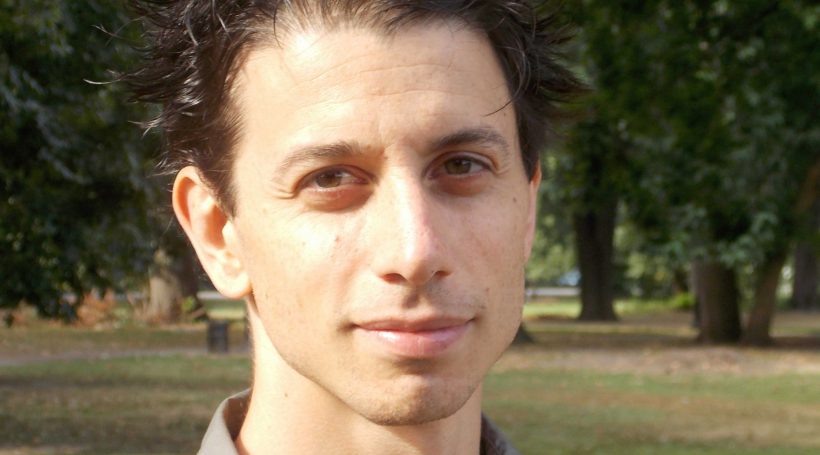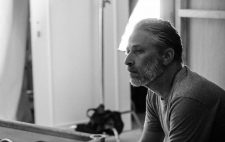The story begins with a simple day-time hike among friends in Syria that quickly turns into an unimaginable nightmare. American Josh Fattal has penned the account of his 782 days held captive in an Iranian prison. He shared his story recently at the Katz JCC Festival of Arts, Books and Culture.
Fattal was visiting his college friend Shane Bauer and Bauer’s girlfriend Sarah Shourd in Syria. “We decided to take a short trip to Iraq to get a little break from life in Syria,” Fattal recalls of that day, July 31, 2009. “We hiked on a mountain that took us to the border of Iraq and Iran, which we didn’t realize. The border guards wouldn’t let us turn around.”
Fattal, then 27, was taken into custody by the Iranian soldiers, along with Bauer and Shourd.
“They threw us in a van and drove us to a police station. Then there was this crazy shuffle where I don’t think they knew what to do with us,” he says. “We were getting passed around from one group of bureaucrats to another. After three days of sleeping in county jailhouses, they drove us eight hours to Tehran. That’s when, in my mind, it hit the no-turning-back point. The fact that three Americans were in custody was getting passed up the Iranian government food chain higher and higher. They used us as hostages, because we were American citizens.”
Once in Tehran, they were placed in Evin Prison, where the language barrier made the situation more difficult. Their captors spoke very little English, and the hikers didn’t speak Persian. Fattal was left in solitary confinement for the first four months and then placed in a cell with Bauer. Shourd was in her own cell throughout her entire ordeal. After the first four months, the three were allowed to be together outside for one hour each day. Letters from home began coming in sporadically, serving as Fattal’s inspiration to keep going.
Fattal passed the time exercising and reading books he received from his family. A television was brought into their cell and in May 2010, an English-speaking news program informed them of an impending visit from their mothers.
“The hours I spent with my mother were the best and most meaningful hours of my years in prison,” says Fattal. “I had been wanting to tell her I loved her since the moment I was captured, and I finally could do that. Seeing my mom reawakened me to how cruel what was happening to me was.”
Shourd was released after 14 months for humanitarian reasons, in exchange for a payment of about a half-million dollars by the Sultan of Oman. After two years, Fattal and Bauer were put on trial and sentenced to an additional eight years in prison.
“I was thinking we’d get closer to 20 or life,” says Fattal. “But even the prison guards knew the trial was a farce. They were patting us on the back on the way out of the courtroom saying, ‘Don’t worry,’ ‘Any day’ in little English expressions or hand movements.”
Fattal and Bauer were finally released on September 21, 2011, each for a half-million-dollar ransom paid by Oman. It’s a day Fattal will never forget.
“We were in the courtyard running in circles – what we would do every day – and when that ended I was really sweaty and wanted to take a shower,” he recalls. “My interrogator showed up and said, ‘Come, follow me.’ From there, he led us out of the prison to an Omani diplomat and to the airport. It was an experience I’d been dreaming of for years at that point and it had felt so close for so long, but I had no indication that it would ever really happen.”
Today Fattal is a PhD candidate studying history at NYU. He lives in Brooklyn with his girlfriend Jenny and 14-month-old son Isaiah Azad (his middle name is the Persian word for free). “Having him felt like a wonderful way to honor and celebrate the freedom I have.”
Upon reflection, Fattal learned a lot about himself while he was imprisoned, beginning with his physical and mental endurance. “It also gave me a whole different relationship between my emotions and my behavior, because if I were to let my emotions rule my behavior in there, I would hurt myself or someone else pretty immediately,” he says. “I learned different tools for caring for myself, especially in solitary.
“Another big lesson is to get to something human under a lot of the news that’s all around us, whether it’s politics or even in personal relationships, where there’s something inhibiting a real human connection. I’ve come to really prioritize that as what’s most important for me. It’s the thing my guards and interrogators took away from me in every way.”
After his release, Fattal wrote a book about his experience, titled “A Sliver of Light: Three Americans Imprisoned in Iran.”
“I want people to know that America’s foreign policy is making it more and more dangerous for Americans,” he says. “There were Belgians, Germans and French people there who were detained for ridiculous reasons, but let out a lot sooner than me.
“The book is also a reflection on freedom. For the reading public, I hope they can benefit from my experience without having to spend 26 months behind bars.”












